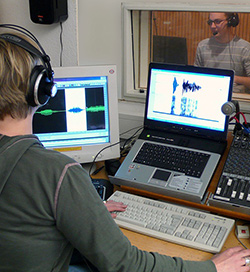Why study linguistics and phonetics?
Humans are the only creatures that possess the skill of language. Language is present in almost all aspects of our life. Without it, human society as we know it becomes unthinkable. Learning how language works also enables us to learn a lot about how humans work.
There are different approaches to studying language. Some departments focus on one language only. The Department of Linguistics does it differently: We look at as many languages as possible that are as different as possible to gain universal insights about language itself.

Why does Latin have 6 cases, and German 4, yet English has none? How do we know who is hitting whom in the sentence John punches Andy? Why do we have to find so many different ways of translating the English -ing form? How do you define a word? And what is meaning and how is it created from the individual elements of language? The General Linguistics section researches these and many similar questions in a variety of languages from all over the world – always with a focus on their similarities and their differences. We are also committed to documenting endangered languages. There are about 5,000 to 6,000 languages spoken today. More than half of them are close to becoming extinct. For this reason, many of our PhD students (some involved with the DoBeS project) travel to far-flung parts of the world – from Australia to Indonesia and all the way up to the extreme north of Canada – to work with speakers of endangered languages (see our map). They are documenting and thus saving an aspect of human culture that would otherwise be lost forever. Language documentation is vital for theoretical linguistics as well. In a world dominated by European languages, linguistic diversity would dwindle and leave us with a distorted view of the nature of language.

The German word Garten, English garden, Latin hortus and Russian gorod – these words all share a common root; they have their origins in the same word. The Historical-Comparative Linguistics section is interested in how one language turns into many different languages through structural and sound changes taking place over the course of time. The Indo-European language family has been extensively researched. Most European languages belong to it. We use this family as an example and describe the changes that took place and their reasons. This also enables us to reconstruct the original language, Proto-Indo-European. The knowledge in itself is valuable and it also lets us know more about the culture of these original people and gain a deeper understanding of prehistoric Europe.

Phonetics in Cologne has two focuses besides the traditional focus on acoustics, articulation and perception: We are interested in prosody, i.e. the melody of spoken language. A broader understanding of prosody also includes phenomena such as accentuation, the segmentation of speech into phrases, as well as the rhythm and speed of speech. We model linguistic articulation by measuring articulatory gestures, which involve the coordination of articulatory organs such as the tip and the dorsum of the tongue, lips or jaws, in our medico-technical lab. We also conduct research on the interaction of prosody and articulation, such as in prominence marking (focus, information structure). Our empirical research into theoretical problems in these subject areas is part of the field of laboratory phonology (experimental phonology), in which Cologne enjoys a network of contacts all over the world.
How does Google Translate work and why does it make so many mistakes? How do search engines know which words occur on which pages? Can a language's grammar be modelled by a computer programme? Can we create machines capable of communicating so effectively that we could confuse them for humans? These are the questions studied by the Information Processing section, blending linguistics and information sciences.
Together, the three sections, General Linguistics, Historical-Comparative Linguistics and Phonetics, offer the bachelor degree programme Linguistics and Phonetics. During the subsequent master’s degree students can select out of a wide range of possibilities for specialization.